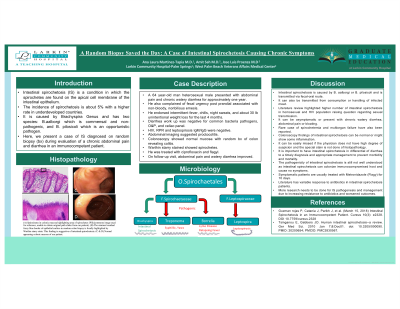Tuesday Poster Session
Category: Colon
P3051 - A Random Biopsy Saved the Day: A Case of Intestinal Spirochetosis Causing Chronic Symptoms
Tuesday, October 24, 2023
10:30 AM - 4:00 PM PT
Location: Exhibit Hall

Has Audio

Ana Martinez-Tapia, MD
Larkin Community Hospital
Miami, FL
Presenting Author(s)
Ana Martinez-Tapia, MD1, Amit Sah, MD2, Jose Proenza, MD3
1Larkin Community Hospital, Miami, FL; 2University of Miami, Atlantis, FL; 3Veterans Affairs Medical Center, West Palm Beach, FL
Introduction: Intestinal spirochetosis (IS) is a condition in which the spirochetes are found on the apical cell membrane of the intestinal epithelium. The incidence of spirochetosis is about 5% with a higher rate in underdeveloped countries. It is caused by Brachyspira Genus and has two species: B.aalborgi which is commensal and non-pathogenic, and B. pilosicoli which is an opportunistic pathogen. Here, we present a case of IS diagnosed on random biopsy (bx) during evaluation of a chronic abdominal pain and diarrhea in an immunocompetent patient.
Case Description/Methods: A 64 year-old man heterosexual male presented with abdominal pain and chronic watery diarrhea for approximately one year. He also complained of fecal urgency post prandial associated with non-bloody, nonbilious emesis. He endorsed intermittent fever, chills, night sweats, and about 30 Ib unintentional weight loss for the last 4 months. Diarrhea work up was negative for common bacteria pathogens, O&P, and celiac panel. HIV, RPR and leptospirosis IgM/IgG were negative. Abdominal imaging suggested proctocolitis. Colonoscopy showed normal mucosa with random bx of colon revealing colitis. Warthin starry stained showed spirochetes. He was treated with ciprofloxacin and flagyl. On follow-up visit, abdominal pain and watery diarrhea improved.
Discussion: Intestinal spirochetosis is caused by B. aalborgi or B. pilosicoli and is transmitted via fecal-oral route. It can also be transmitted from consumption or handling of infected meat. Literature review highlighted higher number of IS in homosexual and HIV population raising question regarding sexual transmission. It can be asymptomatic or present with chronic watery diarrhea, abdominal pain or bloating. Rare case of spirochetemia and multiorgan failure have also been reported. Colonoscopy findings of IS can be normal or might show some inflammation. It can be easily missed if the physician does not have high degree of suspicion and the special stain is not done of histopathology. It is important to have IS in differential of diarrhea to a timely diagnosis and appropriate management to prevent morbidity and mortality. The pathogenicity of IS is still not well understood as IS can colonize immunocompromised host and cause no symptoms. Symptomatic patients are usually treated with flagyl for 10 days. Literature has variable response to antibiotics in IS patients. More research needs to be done for IS pathogenesis and management due to increasing resistance to antibiotics and worsened outcomes.

Disclosures:
Ana Martinez-Tapia, MD1, Amit Sah, MD2, Jose Proenza, MD3. P3051 - A Random Biopsy Saved the Day: A Case of Intestinal Spirochetosis Causing Chronic Symptoms, ACG 2023 Annual Scientific Meeting Abstracts. Vancouver, BC, Canada: American College of Gastroenterology.
1Larkin Community Hospital, Miami, FL; 2University of Miami, Atlantis, FL; 3Veterans Affairs Medical Center, West Palm Beach, FL
Introduction: Intestinal spirochetosis (IS) is a condition in which the spirochetes are found on the apical cell membrane of the intestinal epithelium. The incidence of spirochetosis is about 5% with a higher rate in underdeveloped countries. It is caused by Brachyspira Genus and has two species: B.aalborgi which is commensal and non-pathogenic, and B. pilosicoli which is an opportunistic pathogen. Here, we present a case of IS diagnosed on random biopsy (bx) during evaluation of a chronic abdominal pain and diarrhea in an immunocompetent patient.
Case Description/Methods: A 64 year-old man heterosexual male presented with abdominal pain and chronic watery diarrhea for approximately one year. He also complained of fecal urgency post prandial associated with non-bloody, nonbilious emesis. He endorsed intermittent fever, chills, night sweats, and about 30 Ib unintentional weight loss for the last 4 months. Diarrhea work up was negative for common bacteria pathogens, O&P, and celiac panel. HIV, RPR and leptospirosis IgM/IgG were negative. Abdominal imaging suggested proctocolitis. Colonoscopy showed normal mucosa with random bx of colon revealing colitis. Warthin starry stained showed spirochetes. He was treated with ciprofloxacin and flagyl. On follow-up visit, abdominal pain and watery diarrhea improved.
Discussion: Intestinal spirochetosis is caused by B. aalborgi or B. pilosicoli and is transmitted via fecal-oral route. It can also be transmitted from consumption or handling of infected meat. Literature review highlighted higher number of IS in homosexual and HIV population raising question regarding sexual transmission. It can be asymptomatic or present with chronic watery diarrhea, abdominal pain or bloating. Rare case of spirochetemia and multiorgan failure have also been reported. Colonoscopy findings of IS can be normal or might show some inflammation. It can be easily missed if the physician does not have high degree of suspicion and the special stain is not done of histopathology. It is important to have IS in differential of diarrhea to a timely diagnosis and appropriate management to prevent morbidity and mortality. The pathogenicity of IS is still not well understood as IS can colonize immunocompromised host and cause no symptoms. Symptomatic patients are usually treated with flagyl for 10 days. Literature has variable response to antibiotics in IS patients. More research needs to be done for IS pathogenesis and management due to increasing resistance to antibiotics and worsened outcomes.

Figure: Normal colonic mucosa.
Disclosures:
Ana Martinez-Tapia indicated no relevant financial relationships.
Amit Sah indicated no relevant financial relationships.
Jose Proenza indicated no relevant financial relationships.
Ana Martinez-Tapia, MD1, Amit Sah, MD2, Jose Proenza, MD3. P3051 - A Random Biopsy Saved the Day: A Case of Intestinal Spirochetosis Causing Chronic Symptoms, ACG 2023 Annual Scientific Meeting Abstracts. Vancouver, BC, Canada: American College of Gastroenterology.
